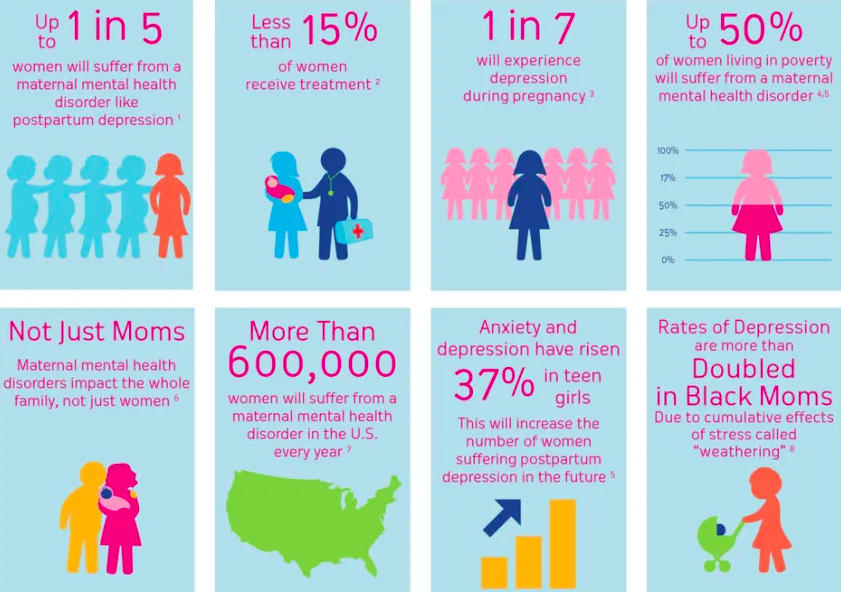Discover effective self-help strategies for coping with postpartum depression. Learn how to build a support network, practice self-care, manage stress, and maintain a positive mindset. Seek professional help and embrace the journey towards recovery and well-being.
Postpartum depression is a typical condition that concerns many new mothers. Understanding that seeking help and support is crucial in overcoming this challenging phase is essential. In this article, we will discuss self-help strategies that can assist in coping with postpartum depression and promoting overall well-being.
Understanding Postpartum Depression
– Definition of postpartum depression
Postpartum depression, also known as postnatal depression, is a type of clinical depression that occurs after childbirth. It is characterized by persistent sadness, anxiety, and exhaustion, which can significantly impact a mother’s daily life and ability to care for herself and her baby.
– Prevalence and risk factors
Postpartum depression affects approximately 10-20% of new mothers. Various risk factors contribute to the development of this condition, including hormonal changes, a personal or family history of depression, a difficult pregnancy or birth, lack of social support, and high levels of stress.
– Symptoms and signs
The symptoms of postpartum depression may vary but often include feelings of sadness, hopelessness, and irritability, loss of interest or enjoyment in activities, changes in appetite and sleep patterns, difficulty bonding with the baby, feelings of guilt or inadequacy as a mother, and thoughts of self-harm or harming the baby.
– Importance of seeking help
Seeking help for postpartum depression is crucial for both the well-being of the mother and the baby. Untreated postpartum depression can have long-term effects on the mother-child relationship and the child’s overall development. It is important to understand that postpartum depression is a treatable condition. With the proper support and strategies, recovery is possible.

Self-Help Strategies for Coping with Postpartum Depression
– Building a support network
Building a solid support network is vital in managing postpartum depression. Surrounding yourself with people who understand and offer support can make a significant difference in your journey to recovery.
Family and friends
Reach out to your family and friends for emotional support and assistance with daily tasks. Let them know how you’re feeling and communicate your needs openly. Having loved ones who can provide a listening ear and lend a helping hand can ease some of the stress and burden associated with postpartum depression.
Support groups
Consider joining support groups specifically designed for mothers experiencing postpartum depression. These groups provide safe and understanding conditions where you can connect with other women who are going through similar challenges. Sharing experiences, exchanging advice, and receiving encouragement from others who can relate can be precious.
Professional help
In addition to the support of family and friends, seeking professional help is crucial. Consult a healthcare professional, doctor, therapist, or counselor specializing in postpartum depression. They can provide guidance and support and recommend appropriate treatment options tailored to your specific needs.
– Practicing self-care
Taking care of yourself is vital when coping with postpartum depression. Engaging in self-care activities can help improve your overall well-being and mental health.
Prioritizing sleep
Not enough sleep can exacerbate the symptoms of postpartum depression. Try to prioritize sleep by establishing a consistent sleep routine, taking naps when possible, and seeking help from your partner or loved ones caring for the baby during the night.
Eating a balanced diet
Preserving a healthy and balanced diet is essential for physical and mental well-being. In your meals, incorporate nutrient-rich foods such as fruits, vegetables, whole grains, and lean proteins. Avoid excessive sugary and processed foods, which can negatively impact your mood and energy levels.
Regular exercise
Engaging in regular exercise can help alleviate symptoms of postpartum depression. Physical exercise releases endorphins, which are natural mood boosters. Start with gentle exercises such as walking, yoga, or swimming, and gradually increase your activity level as you feel comfortable.
Engaging in activities you enjoy
Make time for activities that bring you happiness and relaxation. Whether reading, painting, listening to music, or taking a long bath, engaging in activities you enjoy can deliver a much-needed mental break and help restore a sense of pleasure and fulfillment.
– Managing stress
Stress management plays a significant role in coping with postpartum depression. Implementing effective strategies can help reduce stress levels and improve overall well-being.
Time management techniques
Balancing the demands of motherhood and other responsibilities can be overwhelming. Learn effective time management techniques such as prioritizing tasks, delegating when possible, and setting realistic expectations. Breaking tasks into smaller, manageable steps can also help alleviate feeling overwhelmed.
Relaxation techniques
Incorporate relaxation techniques into your daily routine. Deep breathing exercises, meditation, and mindfulness practices can help calm the mind and reduce anxiety. Consider trying activities such as yoga or tai chi, which promote relaxation and inner peace.
Mindfulness and meditation
Mindfulness and meditation can support you in staying present and reducing negative thoughts and worries. Set aside a few minutes daily to sit silently, focus on your breath, and observe your thinking without judgment. Mindfulness apps and guided meditation resources can provide helpful tools and guidance.
– Seeking therapy
Therapy can be a valuable tool in handling postpartum depression. Therapeutic approaches can help you explore and address underlying issues, develop coping strategies, and promote overall well-being.
Cognitive-behavioral therapy
Cognitive-behavioral therapy (CBT) is a commonly used therapeutic approach for treating postpartum depression. It focuses on identifying and challenging negative thought patterns and behaviors, replacing them with more positive and adaptive ones. CBT equips you with practical skills to manage stress, improve problem-solving, and enhance your overall mood and well-being.
Interpersonal therapy
Interpersonal therapy (IPT) focuses on improving interpersonal relationships and communication skills. It addresses the impact of social support, role transitions, and conflicts on your mental health. IPT can help you navigate the challenges of motherhood and enhance your relationships with your partner, family, and friends.
Supportive therapy
Supportive therapy provides a safe space to express your feelings and concerns without judgment. It offers emotional support, validation, and guidance throughout your journey. Supportive therapy can help you develop coping mechanisms, enhance self-esteem, and strengthen your ability to manage postpartum depression effectively.
Maintaining a Positive Mindset
Maintaining a positive mindset is crucial for coping with postpartum depression. It involves adopting a positive outlook and focusing on the good aspects of your life, even amidst the challenges. Here are some key points to clarify on maintaining a positive mindset:
- Challenging negative thoughts: It often brings negative thoughts and self-criticism. It’s important to recognize these negative thought patterns and challenge them. Change negative thoughts with positive and realistic ones. Remind yourself of your strengths, accomplishments, and love for your baby.
- Practicing gratitude: Cultivating a sense of gratitude can have a powerful impact on your mindset. Take time each day to reflect on and appreciate the positive aspects of your life. Keep a gratitude journal and write down things you are grateful for, no matter how small. This practice shifts your focus towards positivity and helps counterbalance negative emotions.
- Setting realistic expectations: As a new mother, it’s natural to want to excel in every aspect of motherhood. However, setting unrealistic expectations can lead to feelings of failure and disappointment. Be kind to yourself and set realistic expectations. Understand that no one is perfect, and it’s okay to ask for help and take breaks when needed. Celebrate your small victories and embrace the imperfections of motherhood.
By adopting these strategies, you can cultivate a positive mindset that allows you to navigate the challenges of postpartum depression with resilience and optimism. Remember, it’s normal to have ups and downs, but maintaining a positive perspective can help you find strength and hope in your journey toward recovery.
Final Thoughts
In conclusion, coping with postpartum depression is a challenging journey requiring inner strength and external support. By understanding the nature of postpartum and its impact, individuals can take proactive steps to manage their mental health and well-being.
Building a solid support network, encompassing family, friends, support groups, and professional help, is crucial in providing emotional support and guidance during this challenging phase. Engaging in self-care activities, such as prioritizing sleep, maintaining a balanced diet, exercising regularly, and indulging in activities that bring joy, can significantly contribute to overall well-being.
Managing stress through effective time management techniques and relaxation practices, as well as seeking therapy like cognitive-behavioral or interpersonal therapy, can equip individuals with valuable coping skills and promote emotional healing.
Additionally, maintaining a positive mindset by challenging negative thoughts, practicing gratitude, and setting realistic expectations allows individuals to find strength, resilience, and hope in their journey toward recovery.
Remember, postpartum depression is not a sign of weakness or failure as a mother. It is a medical disorder that can be treated and overcome with the right strategies and support. Seeking help is a sign of strength, and reaching out to healthcare professionals and support networks is crucial to reclaiming your well-being and enjoying the precious moments of motherhood.
FAQs
- What is postpartum depression?
- Postpartum depression is a form of clinical depression that happens after childbirth. Persistent feelings of sadness, anxiety, and exhaustion characterize it.
- How common is postpartum depression?
- Postpartum depression affects approximately 10-20% of new mothers.
- What are the symptoms of postpartum depression?
- Symptoms of postpartum depression may include sadness, irritability, loss of interest, changes in sleep and appetite, difficulty bonding with the baby, and thoughts of self-harm or harming the baby.
- Can postpartum depression be treated without professional help?
- While self-help strategies can be beneficial, seeking professional help is essential for effectively treating postpartum depression.
- How long does postpartum depression typically last?
- The duration of postpartum depression varies for each individual. With appropriate treatment and support, most women recover within a few months.
